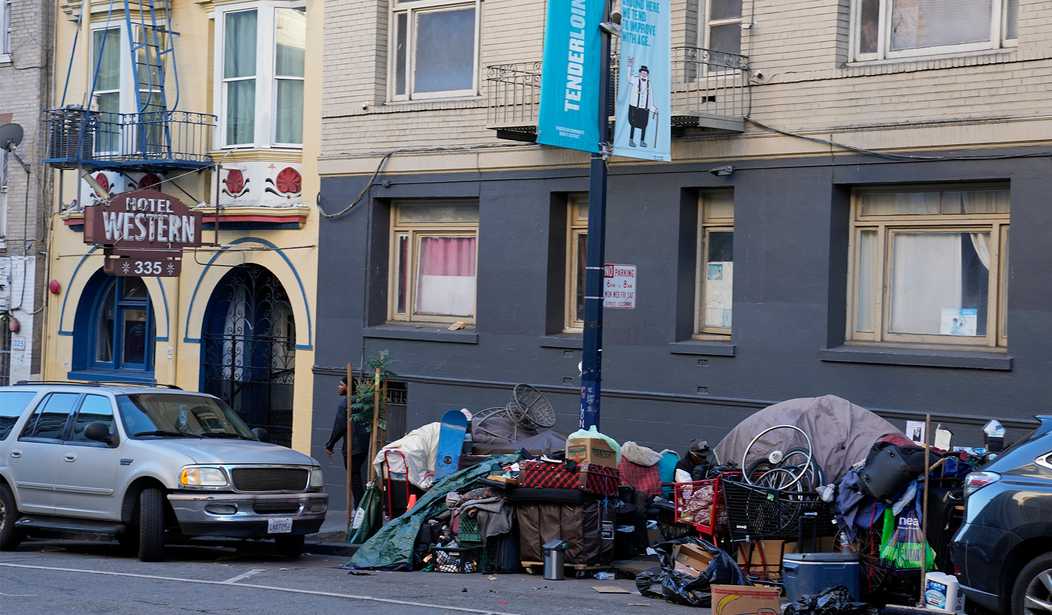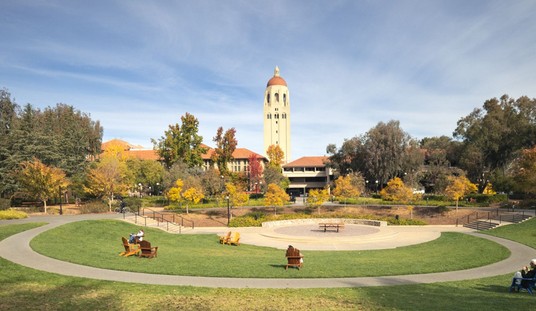Did I say that activists in San Francisco were upset about people blocking the sidewalk? No, that can't be right. What the activists are upset about is "planters" blocking the sidewalk. It's being called "hostile architecture" and now the activists have convinced the city to crack down on it.
San Francisco is ordering the owners of some sidewalk garden planters to move them within 30 days or foot the bill for shifting the heavy metal troughs.
Described as "hostile architecture" by advocates for homeless people, the planters are often used by residents and business owners to deter encampments on the sidewalk.
A number of citations were issued after a group of activists reported what they say were problematic placements of the planters to the Department of Public Works. They allege some of the planters block access for disabled people and pedestrians.
One property manager who was cited by the city wouldn’t speak to The Standard, even anonymously, for fear of retribution from activists.
According to the SF Standard, this planter pushback is being organized by a group of 30 or so activists for the homeless. The gall of these people is truly incredible.
The reason the planters exist is that residents and business owners got tired of their sidewalks being crowded with tents full of homeless people. For instance, last summer a group of about 50 residents got together and raised money to buy a bunch of planters which were set out on Harrison Street in the Mission District.
Neighbors involved in the project said the long stretch of Harrison Street had been blighted in recent years by the encampment, whose occupants allegedly threatened passersby and ran an operation selling parts from stolen bicycles.
The San Francisco Police Department, in an email to The Chronicle, acknowledged that encampments had been a problem in the area, though officials did not address any specific incidents.
The residents in the area did this after talking to a legislative aide for city supervisor Hillary Ronen, a man named Santiago Lerma.
Lerma, who told The Chronicle that a camper in the area once held up a screwdriver and threatened him while he was walking by, acknowledged that the encampment was problematic...
“I certainly understand why they’re doing it,” Lerma said of the neighborhood group’s efforts. “I think it’s a sad state of affairs for our city that citizens feel that they need to barricade the streets to prevent unhoused folks from setting up.”
The planters were adopted not just by this one neighborhood but by people throughout the city. The SF Chronicle wrote about the trend last October:
Outside the City Hope Cafe in San Francisco stand two new large, gleaming metal tubs filled with hundreds of pounds of soil. Installed on the sidewalk last week, the planters will add a touch of greenery to the cafe that serves homeless people for free in the gritty Tenderloin neighborhood.
But the cafe’s operator, the Rev. Paul Trudeau, acknowledges that their purpose is also functional — a tactic that a recent Chronicle block-by-block survey showed is often resorted to by San Francisco residents and businesses to deter encampments on the sidewalks around them after the city proved unable to provide long-term solutions.
At City Hope, an encampment where screaming matches and fights frequently broke out, including one where a person was arrested for beating another with a hammer, has been blocking the front of the cafe for months, Trudeau said — and despite near-daily calls to 911, the campers repeatedly returned.
So people were doing this as a way to deal with a problem the city clearly could not deal with. And the city was not openly encouraging this but also wasn't preventing it because the city also knows that it can't offer any other help to these residents and business owners who are tired of the filth and chaos.
But here we are a few months later and a tiny group of activists is forcing the city to punish those same residents and business owners for trying to defend themselves. Even worse, they are claiming the planters are limiting access to the sidewalks knowing full well that the moment the planters are removed, the tent camps will be back. In other words, they don't care a bit about sidewalk access or about the people who live in these neighborhoods, they only care about making it easier for the homeless to spread out wherever they want.
One of the activists is identified in the SF Standard as Hazel Williams. She's exactly who you'd imagine her to be, a Democratic Socialist community organizer who writes stuff like this:
Not to be overly poetic, but under capitalism public records do not simply shine light onto a system that would serve the people if not for the misdeeds of corrupt officials who would scheme in its dark corners. On the contrary, they lay bare the brutal nature of a system functioning as intended and bring to the naked light of day its inherent contradictions - perhaps none more stark than the inability of a city as rich as San Francisco to house or even shelter thousands of its own residents, instead devoting endless resources to innovative ways to displace and punish them.
The architects of this hostility cycle in and out of power each election season and the system’s machinations adapt to changing conditions, sometimes attenuating, sometimes amplifying, but always serving the same basic function: managing the contradictions of capitalism to protect the interest of profits over the needs of the people.
Of course San Francisco spends something like $600 million dollars a year on the homeless, more if you include federal funds. It provides thousands of shelter beds and yet, there are a lot of people on the street who refuse offers of shelter. Why? Because they'd rather be on the street with fewer rules and better access to drugs. There's actually a Supreme Court case looking at this issue right now and San Francisco is asking the Court to recognize that people who choose to be on the street and reject offers of shelter should not count as involuntarily homeless. Hopefully the city will win that case and some level of sanity (and maybe some planters) will return to the city's sidewalks.







Join the conversation as a VIP Member